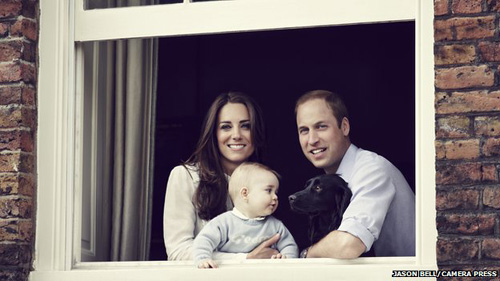
|
Prince George will be in the spotlight as he heads to Australia and New Zealand with the Duke and Duchess of Cambridge. What can they expect on their first engagements as a family of three? He's not even nine months old yet, but he's already making a big impact. George Alexander Louis is about to embark on his first official foreign tour - with his mother and father too, of course. And it can reasonably be said that a good many people in New Zealand and Australia appear to be getting rather excited about the three-week trip, which starts in Wellington on Monday and ends in Canberra on 25 April. The normally rumbustious, hard-edged Kiwi/Aussie attitude to visiting Poms seems to have been suspended for William, Catherine and George. Barbs about alleged sporting deficiencies in the "old country" have been replaced by baby talk - about teething (is he?), crawling (can he?) and walking (might he, on this trip?). In part, the Aussie/Kiwi soppiness (words which one wouldn't normally expect to find together) might be explained as being a perfectly normal reaction to a baby, the presence of whom is a pretty universal antidote to cynicism. But there appears to be evidence of something else here. Are we, perhaps, witnessing the emergence of a renewed enthusiasm for the long-term future of the monarchy in New Zealand and Australia? Not so many years ago, real questions were being raised about whether these former British dominions wanted to retain a system whereby people who lived on the other side of the world and who visited infrequently were nonetheless regarded as "their" head of state and "their" royal family. It was said to be an anachronism from the days of Empire that was no longer appropriate. The doubts were at their height - in Australia at least - nearly 15 years ago in the constitutional referendum of November 1999 when 45% of those who voted expressed a preference for a republic. But in the years since, Australia and New Zealand seem to have been swept along (and republican feelings largely swept away) by the impact of an increasingly venerated monarch and the emergence of a glamorous young couple with a baby, around whom all kinds of popular dreams (and, it must be said, countless media schemes to boost reader and viewing figures) have been constructed. When William, Catherine and baby George disembark, first in Wellington and later in Sydney, they will be welcomed not merely as the "super-celebrities" they undoubtedly are, but as prospective kings and as a future queen consort of New Zealand and Australia. Large crowds are expected to greet them at each of their public engagements. The authorities have already been producing maps to indicate where spectators can find the best vantage points. In the lead-up to the visit those spectators are likely to have been reminded of William's first visit to Australia, when he was brought by his proud parents back in 1983 at roughly the same age as George is now. They will have seen stories about how George has grown as well as speculation about how he'll behave at the two engagements to which he's expected to be taken by his parents (one in each country) and how the whole trip has been designed with him very much in mind. Unlike the programme for their visit to Canada in the summer of 2011, when the newly married William and Catherine were prepared to attend functions from morning until night, this time the programme stops on most days in the late afternoon so that the couple can get back to George, presumably to read him a story and put him to bed. Consequently evening engagements for the couple are being kept to a minimum. Does any of it have any significance? Well, yes I suggest it does, for the monarchy that is. Visits by the royals to New Zealand and Australia are important for the simple reason that these countries - for all their 21st Century vigour and independence - still come within the ambit of the monarchy which is headquartered at Buckingham Palace in London. The reception that William, his wife and son receive over the next three weeks will say something about the vitality of the British crown and its relevance in 2014. Clearly not everyone who turns out to cheer William, Catherine and George will necessarily subscribe to the view that, 50 years or so from now, when George might be expected to succeed to the throne of the United Kingdom, that he should also become king of Australia and king of New Zealand. But as ambassadors for the system of hereditary, constitutional monarchy, this trio exert a powerful force. A great-grandmother in London can be expected to be watching events carefully and - one might assume - to be pleased at what she sees. |
喬治王子隨同劍橋公爵夫婦出游澳大利亞和新西蘭成為萬眾矚目的焦點(diǎn)。這一家三口在其第一次全家旅行期間有何期待呢? 雖然喬治王子還未滿九個(gè)月,卻已產(chǎn)生了重大的影響。 喬治·亞歷山大·路易斯即將開始他第一次官方的國外之旅,當(dāng)然少不了他的父母。 我們可以說新西蘭和澳大利亞許多民眾對王室一家三周的旅行感到非常興奮,這種說法也是合理的。這次旅行從4月7日的惠靈頓之游開始到25日堪培拉之游結(jié)束。 通常吵吵嚷嚷的新西蘭人和澳大利亞人對即將來訪的英國佬持有犀利無比的態(tài)度,這次似乎因威廉、凱瑟琳和喬治而變得矜持了。 關(guān)于所謂“老國家”缺乏運(yùn)動(dòng)的冷嘲熱諷已由牙牙學(xué)語代替——牙齒(長了嗎?)、爬著走(他會(huì)嗎?)、走路(這次旅行中,可能嗎?)。 某種程度上,澳大利亞人及新西蘭人的多情(通常人們不會(huì)看到這幾個(gè)詞同時(shí)使用的情況)也許可以解釋為大眾對嬰兒再正常不過的反應(yīng)——在世界各地,只要嬰兒一出面,冷嘲熱諷全失效。 但似乎還有其他原因來證明為何澳大利亞人和新西蘭人態(tài)度大轉(zhuǎn)變。 也許,我們正見證人們對新西蘭和澳大利亞未來長期的君主政體熱情復(fù)燃? 還在幾年前,有人提出這樣一個(gè)現(xiàn)實(shí)的問題:曾經(jīng)是英國自治領(lǐng)地的新西蘭和澳大利亞是否想維持君主體制,借此住在另一個(gè)半球、不常來訪的英國人仍被人當(dāng)做“新西蘭人和澳大利亞人”的元首和“新西蘭人和澳大利亞人”的皇室家族。 有人說君主體制是大英帝國時(shí)期留下來的殘余,在現(xiàn)在不再合適了。 就在近15年前,即1999年11月澳大利亞舉行的憲法公投顯示45%的投票人偏愛共和政體,使得這一疑問達(dá)到頂峰。 不過最近日漸受人尊敬的女王和年輕迷人的夫婦及其嬰兒,似乎吸引了澳大利亞和新西蘭(人們共和政體的感情也在很大程度上一掃而空)。圍繞著這個(gè)皇室一家三口,生出了各種各樣的大眾夢(必須說出來的話,是無數(shù)媒體想要增加讀者數(shù)量和閱覽數(shù)據(jù)的陰謀)。 威廉、凱瑟琳和嬰兒喬治啟程,先到惠靈頓,再去悉尼,他們不僅會(huì)作為“超級(jí)名流”受到熱烈的歡迎,毫無疑問他們就是“超級(jí)名流”,還會(huì)作為新西蘭和澳大利亞未來的國王和王后受到人們的喜愛。 預(yù)計(jì)會(huì)有一大群人在他們出入公共場合時(shí)迎接他們。官方已經(jīng)繪制了觀眾能找到最佳觀看位置的地圖。 這次出游的前奏是觀眾可能會(huì)想起威廉第一次到訪澳大利亞的情形。1983年他那自豪的父母帶著他來到澳大利亞,當(dāng)時(shí)他和喬治差不多大。 大家會(huì)看到喬治長多大了,會(huì)猜測喬治在兩次公眾露面中會(huì)不會(huì)聽話。他將由父母帶著在新西蘭和澳大利亞分別露一次面。大家都很關(guān)心有喬治王子隨行,這次旅行的整個(gè)安排會(huì)是怎樣。 不像他們2011年夏季出訪加拿大一樣,當(dāng)時(shí)新婚的威廉和凱瑟琳準(zhǔn)備好從早到晚參加各種活動(dòng),這次大多數(shù)時(shí)候的行程安排在下午晚些時(shí)候就結(jié)束了,這樣劍橋公爵夫婦能回到喬治身邊,人們猜測他們會(huì)給他讀睡前故事,哄他入睡。 結(jié)果劍橋公爵夫婦晚上的活動(dòng)少之又少。 會(huì)不會(huì)有何重大意義呢?那個(gè),會(huì),我猜想會(huì),對君主體制有著重大意義。 皇室家庭出訪新西蘭和澳大利亞意義重大,原因很簡單,那就是這些國家——盡管充滿了21世紀(jì)的活力和獨(dú)立——仍屬于君主體制的范圍內(nèi),這一體制的總部位于倫敦的白金漢宮。 接下來三周威廉和他的妻兒受到的接待將說明英國王冠的活力及其與2014的關(guān)聯(lián)。 顯然那些為威廉、凱瑟琳和喬治歡呼的人群中,并非每個(gè)人都贊同這樣一種圖景,即距今約50年后,喬治也許要繼承英國王位時(shí),他還應(yīng)該是澳大利亞和新西蘭的國王。 不過作為這一世襲君主立憲制度的形象大使,這一家三口會(huì)產(chǎn)生重大的影響。 在倫敦,一位曾祖母(英國女王)預(yù)計(jì)會(huì)審慎地看著這次出訪——大家可以假定——看到這一切,她會(huì)很開心。 (譯者 易文婷 編輯 丹妮) 掃一掃,關(guān)注微博微信
  相關(guān)閱讀 |
